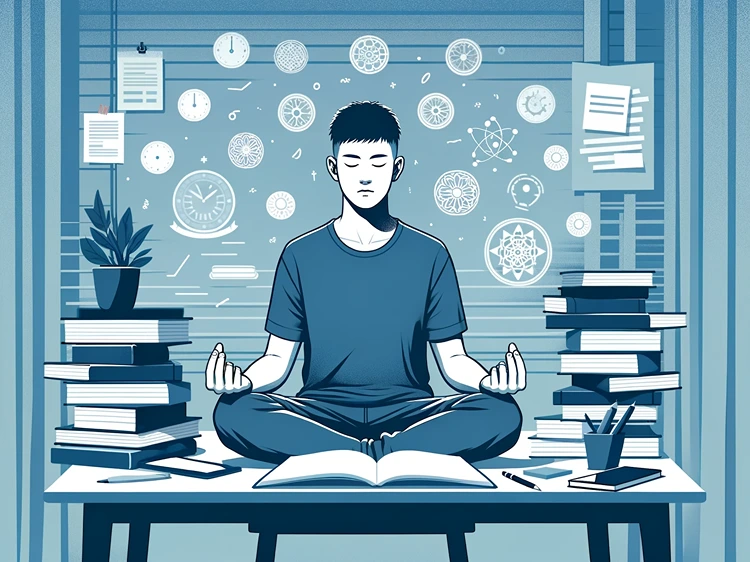The modern student faces a myriad of challenges, from the pressure of academic performance to the distractions of digital life. Amidst these challenges, finding effective strategies for improving concentration and memory is crucial. Enter yoga, an ancient practice that offers modern solutions. But how exactly can yoga benefit students striving for academic excellence? This guide explores the connection between yoga, concentration, and memory enhancement, offering practical advice for incorporating yoga into your study routine.
The Science Behind Yoga and Brain Function
Yoga is more than just physical postures; it’s a holistic practice that integrates physical movement, breath control, and meditation. Research shows that regular yoga practice improves various aspects of brain function, particularly attention, concentration, and memory. These benefits are attributed to yoga’s ability to reduce stress, enhance blood flow to the brain, and promote mental clarity.
Yoga Poses for Enhancing Concentration
Several yoga poses are particularly effective for boosting concentration and mental focus. Here are a few to incorporate into your daily routine:
- Tree Pose (Vrikshasana): This balancing pose enhances focus and clarity by requiring concentration on a single point to maintain balance.
- Eagle Pose (Garudasana): Another balance-focused pose, Eagle Pose, challenges your focus while also relieving stress and improving blood circulation.
- Lotus Pose (Padmasana): A classic pose for meditation, Lotus Pose, supports deep concentration and relaxation, preparing the mind for focused study sessions.
Helpful Hint:
Practicing yoga in a quiet, clutter-free space can enhance the concentration benefits of these poses. Even just 10-15 minutes daily can make a significant difference in your mental clarity.
Pranayama: Breathing Techniques for a Sharp Mind
Pranayama, or yogic breathing techniques, play a crucial role in enhancing cognitive functions. Techniques such as Alternate Nostril Breathing (Anulom Vilom) and the Bee Breath (Bhramari Pranayama) are known to calm the mind, reduce anxiety, and improve focus. Integrating pranayama into your study routine can help prepare your brain for intense concentration and enhance retention capabilities.
Meditation for Memory Retention

Meditation, a core element of yoga, directly impacts memory and concentration. Regular meditation practice has been shown to increase the thickness of the hippocampus, the area of the brain associated with memory. Additionally, mindfulness meditation improves attention span, making it easier to focus during long study sessions.
Helpful Hint:
Starting or ending your day with a 5-minute meditation can significantly impact your mental state, enhancing both concentration and memory retention.
Advanced Yoga Poses for Cognitive Boost
Beyond the basics, certain advanced yoga poses can further stimulate brain function and improve mental agility. Incorporating these poses into your routine can enhance your ability to focus on complex subjects and retain information more effectively.
- Plow Pose (Halasana): This inversion increases blood flow to the brain, promoting mental clarity and reducing fatigue.
- Shoulder Stand (Sarvangasana): Another inversion that improves blood circulation to the brain, boosting concentration and memory.
- Forward Fold (Paschimottanasana): Calms the mind and relieves stress, making it easier to focus on studies.
Helpful Hint:
Incorporate these advanced poses gradually into your practice, ensuring proper form to avoid any injuries. A short yoga session before starting your study routine can prime your brain for learning.
Creating a Yoga-Inspired Study Routine

Blending yoga into your daily study routine can transform your learning experience. Here’s how to create a balanced schedule that incorporates yoga, study, and relaxation:
- Begin with Pranayama: Start your study session with 5 minutes of yogic breathing to calm your mind and prepare it for absorbing new information.
- Intersperse with Short Yoga Breaks: For every hour of study, take a 5-10 minute yoga break. Practice poses like Tree Pose or Forward Fold to rejuvenate your mind.
- End with Meditation: Conclude your study session with a short meditation, focusing on gratitude for the day’s learning and setting intentions for future study sessions.
Yoga as a Tool for Exam Preparation
The stress of exams can undermine performance, making it hard to concentrate and recall information. Yoga offers an effective antidote. A brief yoga session before starting your revision can enhance focus, while pranayama techniques during breaks help maintain a calm and clear mind. On exam day, practice a few minutes of meditation to center yourself and boost confidence.
Integrating Yoga into Academic Life
Making yoga a consistent part of your academic life requires commitment but the benefits are well worth it. Here are some tips to seamlessly integrate yoga into your routine:
- Schedule Regular Yoga Sessions: Just as you schedule study time, make yoga a non-negotiable part of your daily routine.
- Join a Yoga Club at School or College: Many educational institutions offer yoga clubs or classes, providing a community of like-minded individuals.
- Use Yoga for Stress Relief: Turn to yoga in moments of high stress, using the practices learned to bring about immediate calm and focus.
Helpful Hint:
Explore yoga apps or online platforms for guided practices that fit into your academic schedule. Even short sessions can significantly impact your well-being and academic performance.
Yoga is more than physical exercise; it’s a comprehensive approach to wellness that can significantly enhance a student’s capacity for concentration and memory. By integrating yoga practices into your daily routine, you can navigate the challenges of academic life with greater ease and success.
FAQs
Can Yoga Really Improve My Grades?
While yoga directly impacts grades isn’t straightforward, the benefits of yoga, including improved concentration, reduced stress, and better sleep, can indirectly enhance academic performance. Consistency and a balanced approach are key.
How Long Should I Practice Yoga for the Best Results?
Even short, daily sessions of 15-20 minutes can offer significant benefits. The key is regularity rather than duration. Tailor your practice to fit your schedule and needs, focusing on quality over quantity.
Are There Specific Times Best Suited for Yoga Practice?
Yoga can be beneficial at any time of day. Morning practice can energize and set a positive tone for the day, while evening sessions can help unwind and process stress. Experiment to find what works best for you.
Do I Need Special Equipment to Start Practicing Yoga?
A yoga mat is helpful but not essential. Comfortable clothing that allows for movement is more important. Over time, you may choose to incorporate props like blocks or straps to aid your practice, but they are not necessary to begin.
Bottom Line
Yoga offers a holistic approach to tackling the academic and personal challenges faced by students. By enhancing mental clarity, reducing stress, and improving physical well-being, yoga can be a powerful ally in the pursuit of academic excellence. Whether through focused breathing exercises, meditative practices, or physical postures, integrating yoga into your daily routine can open the door to a more balanced, focused, and fulfilling academic experience.
Embrace yoga not just as a practice but as a lifestyle change that fosters greater self-awareness, resilience, and a deepened capacity for learning. With each pose and each breath, you’re not only preparing your body and mind for the challenges of academia but also for the broader journey of life.
Remember, the journey of yoga is personal and unique to each individual. Start where you are, use what you have, and do what you can. The benefits will unfold in time, reflecting not only in your academic performance but in the overall quality of your life.
